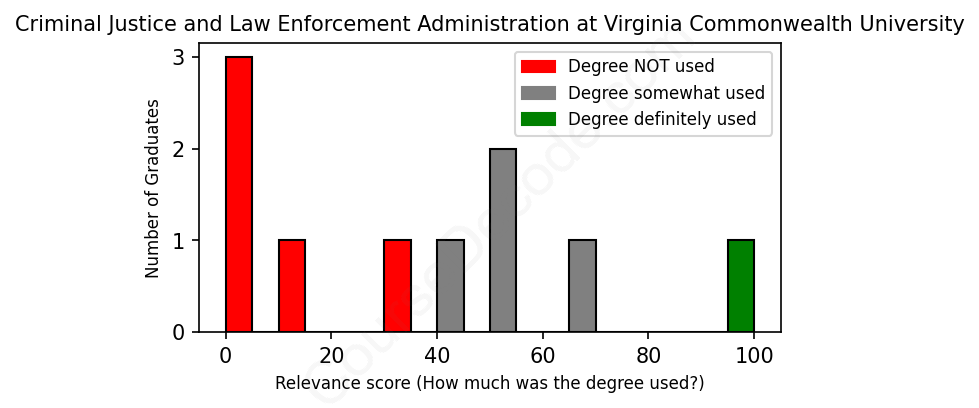
First, some facts. Of the Criminal Justice and Law Enforcement Administration graduates from Virginia Commonwealth University we've analyzed , here's how many have used (or NOT used) their degree in their career:

These are estimates based on AI analysis of 10 LinkedIn profiles (see below).
The verdict? Horrible! Overall, with an average relevance score of 34%, Criminal Justice and Law Enforcement Administration graduates from Virginia Commonwealth University have an exceptionally lower likelihood (-33%) of finding work in this field compared to the average graduate across all fields:
And for comparison, here's the chart for all profiles we've looked at across all degrees.
Also, after graduating, only 10% of these graduates have pursued further education other than another Bachelor's degree (such as a Masters degree or other), compared to the average across all profiles of 35%. This suggests a Bachelors degree is enough for most Criminal Justice and Law Enforcement Administration graduates, and it's normal to look for work straight after graduation.
See the details:
|
Relevance score: 30% We think this person has NOT gone into a career related to their degree. We think this person has NOT gone into a career related to their degree.
DEGREE INFOGraduated in 2019 from Virginia Commonwealth University with a Bachelor of Science - BS in Criminal Justice and Law Enforcement Administration. No other secondary education since. JOB HISTORY SINCE GRADUATIONProgram Service Coordinator Multicultural Clinical Center Dec 2019 - Oct 2021 Analyst  Virginia Department for Aging and Rehabilitative Services (DARS) Sep 2021 - Present ABOUTNo information provided. |
The top 10 most common jobs done by the graduates we've analyzed (ranked most common to least) are:
When looking at the jobs held by graduates from Virginia Commonwealth University with a Criminal Justice and Law Enforcement Administration degree, it's clear that many have ventured into roles that aren't closely related to their field of study. A significant number have taken positions in food service and management, like General Manager or Shop Leader, which mainly focus on operational tasks and customer service rather than enforcing laws or working within the justice system. Even roles like Account Executive or Property Manager steer away from criminal justice-related responsibilities, emphasizing sales or property management instead.
However, there are some exceptions. A few graduates have found their way into positions that align well with their degree, especially in roles like Fraud Investigations Specialist and AML Investigator, where the skills learned in their studies play a central role in their day-to-day tasks. Likewise, positions within the military, like a Physical Security Officer, demonstrate a clear connection to criminal justice principles. Overall, the trend shows a mixed bag of employment; while some graduates pursue careers that leverage their education directly, many end up in roles that don't utilize their specialized skills or knowledge in criminal justice.
Here is a visual representation of the most common words in job titles for Criminal Justice and Law Enforcement Administration graduates (this is across all Criminal Justice and Law Enforcement Administration graduates we've analyzed, not just those who went to Virginia Commonwealth University):

Looking at the career paths of graduates from Virginia Commonwealth University who earned degrees in Criminal Justice and Law Enforcement Administration, it seems there's a mixed bag of outcomes. Many of the early-career jobs—like those working at GEICO or in various support roles at banks—aren't directly linked to criminal justice or law enforcement. People often start with customer service positions or similar roles that might not fully utilize their degree. For instance, a couple of graduates have worked in administrative jobs or even retail management, which indicates that their first jobs after graduation might not always align with their field of study.
As time progresses, we start to see some professionals finding their footing in more relevant roles, especially around the five-year mark. For example, a few graduates moved into positions such as fraud investigation and security management, which definitely relate back to their studies. However, it's also notable that some ended up in jobs that are either outside of law enforcement or do not heavily draw on their criminal justice education. Overall, while there are some who carved out successful careers within the field, others seem to have veered off into quite different trajectories, leading to mixed success in finding jobs that truly reflect their educational background.
Getting a Bachelor’s degree in Criminal Justice and Law Enforcement Administration at Virginia Commonwealth University is generally considered to be manageable, especially if you have an interest in the subject. Most people find that the coursework covers a mix of theory and practical applications, and while it can get a bit challenging—particularly with research projects or studying laws and regulations—it's not usually seen as super difficult compared to some other majors. If you stay organized, keep up with your classes, and don’t procrastinate, you’ll likely find it to be a pretty doable path. Plus, the professors are usually pretty supportive, which helps a lot!
Most commonly, in the LinkedIn profiles we've looked at, it takes people 4 years to finish a Bachelor degree in Criminal Justice and Law Enforcement Administration.
Looking at the job histories of these Criminal Justice and Law graduates from VCU, it seems like they’re making a decent living overall. Many of them have climbed the ranks in their respective fields, with roles that suggest they’re moving towards good salaries, especially those working in areas like AML investigations and account executive positions. The ones who’ve stuck around companies like GEICO and Capital One are likely bringing in solid paychecks, given the nature of those jobs. Of course, starting salaries for some positions, especially in public service, might be on the lower end, but with experience and upswing in roles, they should be doing just fine. Plus, let's not forget that a few of them have really unique paths, like the professional basketball player—definitely a different ballpark in terms of earning potential!
Here is a visual representation of the most common words seen in the "about" section of LinkedIn profiles who have a Bachelor degree in Criminal Justice and Law Enforcement Administration (this is across all Criminal Justice and Law Enforcement Administration graduates we've analyzed, not just those who went to Virginia Commonwealth University). This may or may not be useful:

Here are all colleges offering a Bachelor degree in Criminal Justice and Law Enforcement Administration (ordered by the average relevance score of their Criminal Justice and Law Enforcement Administration graduates, best to worst) where we have analyzed at least 10 of their graduates:
| College | Score | Count |
|---|---|---|
 American Military University American Military University
|
81 | 10 |
 Columbia Southern University Columbia Southern University
|
70 | 16 |
 Western Illinois University Western Illinois University
|
63 | 20 |
 Columbia College Columbia College
|
59 | 10 |
 John Jay College (CUNY) John Jay College (CUNY)
|
57 | 11 |
 University of Phoenix University of Phoenix
|
54 | 88 |
 Florida International University Florida International University
|
53 | 13 |
 Park University Park University
|
53 | 23 |
 Virginia Commonwealth University Virginia Commonwealth University
|
34 | 10 |